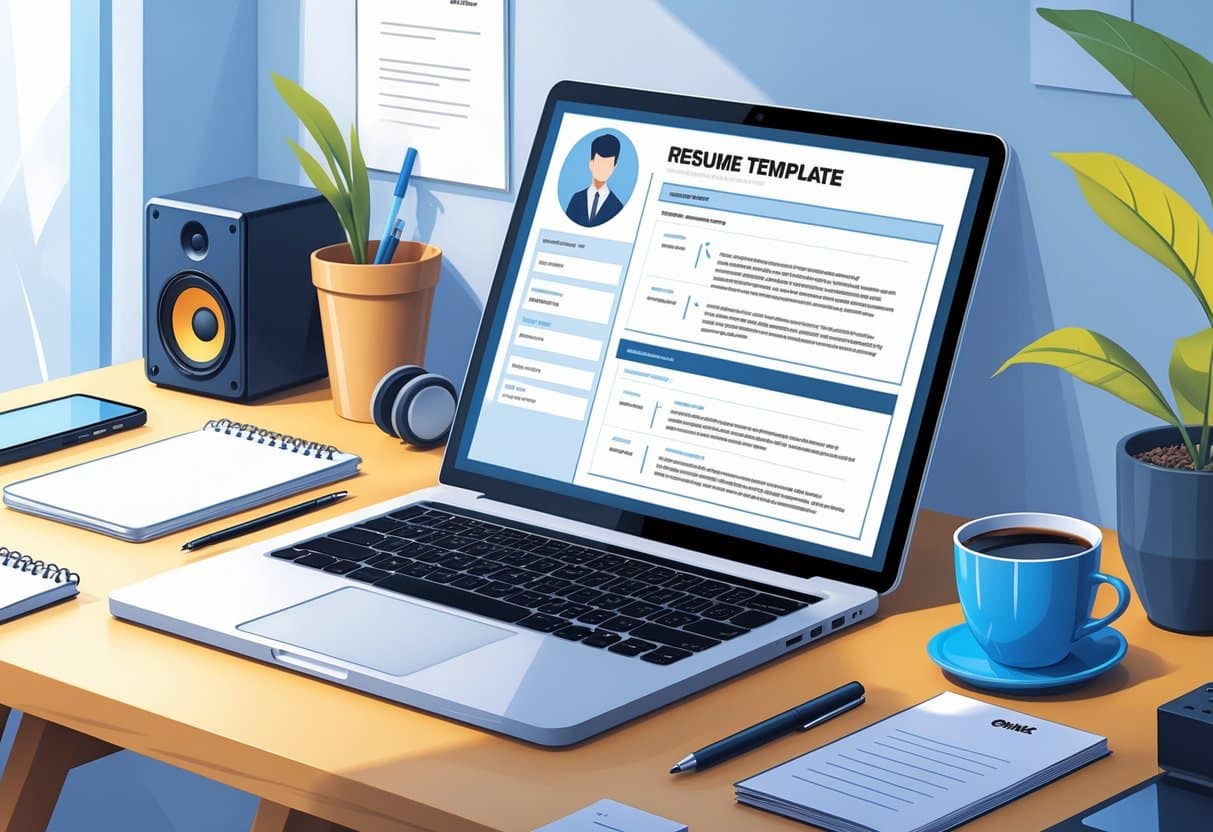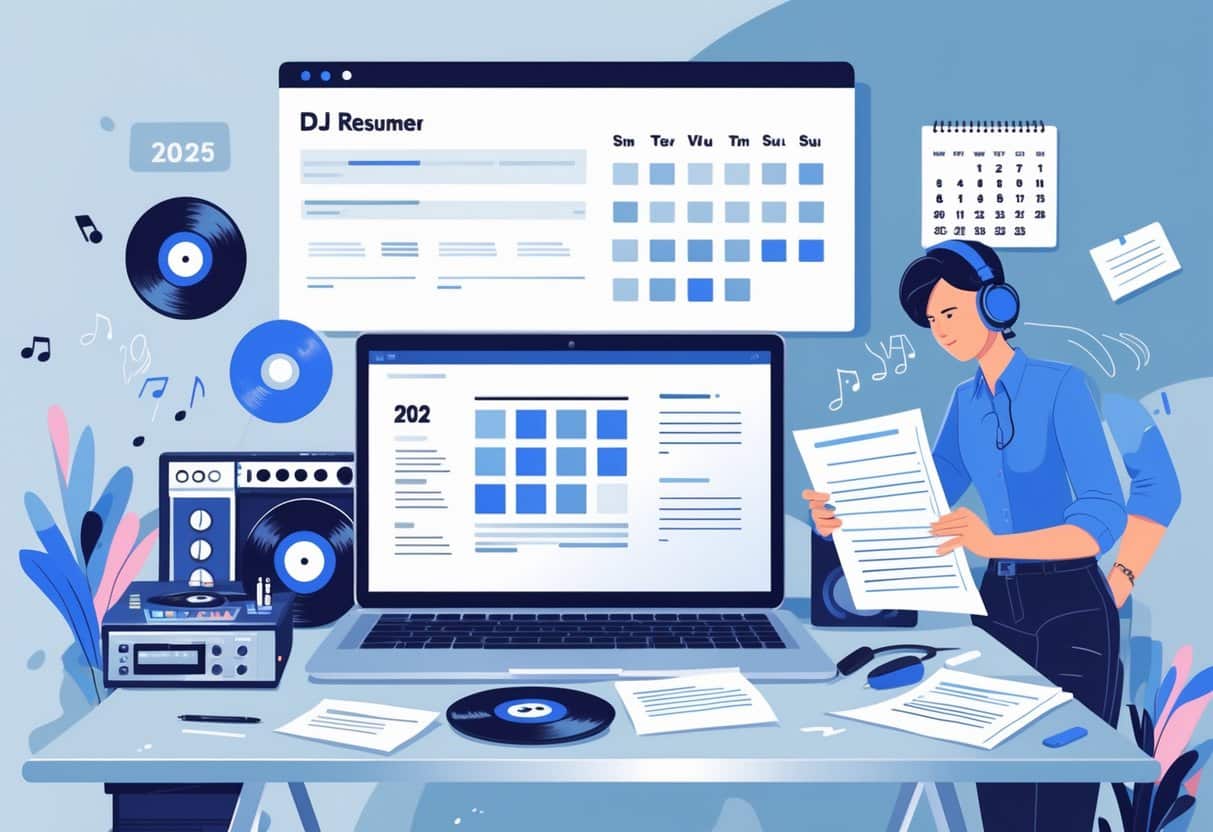Crafting a great DJ resume is important for getting noticed by clubs, event planners, and music venues. A strong resume helps DJs stand out and quickly shows their skills, experience, and what makes them unique.

This guide shares seven clear DJ resume examples and tips for 2025, making it easier for job seekers to create a resume that gets attention in today’s competitive music industry. Readers will find practical advice to help land their next DJ opportunity.
1) Choose the right resume format: chronological, functional, or combination
Choosing the right resume format is important for DJs who want their skills and experience to stand out to club owners or event organizers. The three main resume formats are chronological, functional, and combination (also called hybrid). Each has pros and cons depending on a person’s background and career path.
A chronological resume lists a person’s jobs from most recent to oldest. This format works well if they have steady DJ work or job progression without large gaps. In contrast, a functional resume focuses on skills and achievements instead of jobs and dates. This style is good for new DJs, those with gaps, or people switching careers.
A combination resume blends both styles and highlights a person’s skills first, followed by a quick work history. This approach is growing in popularity and works well for people with strong DJ skills and some relevant experience. Tools like RoboApply’s AI resume builder help DJs compare formats, check their resume for errors, and optimize keywords for applicant tracking systems. For more on choosing the right format, see this resume format breakdown.
For most DJs, the format choice should highlight their strengths. If there’s consistent experience, chronological is best. If they need to focus on skills, start with functional or a combination format. RoboApply makes it easy to test which format gets noticed by recruiters.
2) Highlight proficiency in music software like Serato, Traktor, or Virtual DJ
DJs should clearly list which music software they know, such as Serato, Traktor, or Virtual DJ. This shows employers that they can use modern tools to mix music and run events smoothly. These skills are important for any DJ job, whether performing live or creating mix sets in the studio.
RoboApply’s AI resume builder makes it easy to add these technical skills in a way that stands out to hiring managers and automated resume screens. When entering your experience, be specific about which platforms you use and how you use them.
For example: Proficient in Serato DJ Pro and Traktor Pro 3; routinely mix, cue, and transition between tracks using advanced features such as key lock, looping, and effects. Experienced in setting up digital audio interfaces and integrating controllers for live club sets and private events. Comfortable troubleshooting software and hardware issues in fast-paced environments.
Including this level of detail helps your resume pass applicant tracking systems, shows your competence, and can set you apart from other DJs, as explained in tips from DJ resume guides. Make sure to update your skills on your resume whenever you learn a new program or feature.
3) Showcase experience with diverse music genres and live events
Employers look for DJs who can adapt to different crowds and read the room. Listing diverse music genres and types of live events on a resume shows flexibility. It also proves the DJ can engage various audiences, which is a highly valued skill in both clubs and private events.
Hiring managers want to see specific genres and event types, not just “DJ experience.” For example, a section might state: “Skilled in live mixing across genres including hip-hop, EDM, pop, and Latin. Experienced in weddings, corporate functions, nightclubs, and music festivals.” Be concrete and clear so the impact is easy to see.
Using a tool like RoboApply’s AI resume builder makes it simple to organize music genres, live settings, and performance highlights into action-oriented bullet points. RoboApply also offers a built-in grammar checker to keep details clear and professional.
Here is a full, ready-to-use resume snippet that demonstrates how to showcase this kind of experience:
DJ EXPERIENCE
Club DJ, Metro Beats, Boston, MA
June 2021 – Present
- Performed at over 75 events including corporate parties, nightclubs, and music festivals
- Expertly mixed sets in genres such as house, hip-hop, Top 40, and reggaeton
- Recognized for the ability to read diverse crowds and adjust music style in real time
- Provided seamless transitions between live performers and DJ sets at festivals
Showing a variety of music styles and live settings like this demonstrates real, practical range to potential employers. For more formatting help, RoboApply’s resume builder can guide users through the process or check their draft for any missing details. For more about why this is important, see these tips on listing genres and events in a DJ resume and examples of how to discuss crowd reading and event settings.
4) Include technical skills such as sound equipment setup and mixing
Technical skills are important for any DJ applying for work. Showing skills like sound equipment setup and mixing on a resume tells employers the DJ can do the job, not just play music. These skills should be listed clearly on the resume to help hiring managers see the DJ’s abilities right away.
When building a resume, it helps to be specific. Instead of just saying “mixing,” list equipment and software brands, like “Proficient with Serato, Traktor, and Pioneer CDJs.” Mentioning both hardware and software shows full knowledge of the setup process, which is crucial for events and clubs.
RoboApply makes adding and organizing technical skills efficient. Its resume builder suggests skills that match job listings, and the resume grammar checker ensures every skill sounds professional. This means DJs can spend less time worrying about wording and more time focusing on their music.
Short snippet for the skills section:
Technical Skills:
- Expertise in DJ equipment setup (turntables, Pioneer CDJs, mixers)
- Advanced mixing and beatmatching
- Proficient with Serato, Traktor, and Ableton Live
- Quick troubleshooting and live sound adjustment
Including a clear technical skills section like this helps applicants stand out. Employers look for DJs who can handle unexpected issues, so showing equipment know-how gives the resume an extra edge. For more examples of key technical skills, see this guide to DJ equipment setup and mixing details.
5) Demonstrate ability to read and engage the crowd effectively

Hiring managers look for DJs who can read the mood of an audience and adjust their music or style to keep people interested. This is a key skill for any successful DJ, and describing it clearly on a resume can help you stand out from other applicants. Focus on actual situations where you adapted your set or interacted with the audience to boost energy and engagement.
To grab attention, show concrete examples instead of general statements. Noticeable phrases like “maintained high energy during peak hours by switching genres” or “adapted playlists based on live crowd feedback” help paint a clear picture. Remember to tailor descriptions to your specific experience.
Here’s a plain-text resume example showing how to highlight this skill:
Live DJ – Main Stage, Nightlife Club
June 2022 – May 2025
- Assessed audience reactions throughout each set and shifted between electronic, hip-hop, and pop to keep the dance floor full
- Responded to song requests, incorporated crowd favorites, and increased show attendance by 20% through live act adaptation
- Used lighting changes and microphone interaction to boost excitement and maintain strong crowd engagement for three-hour events
For more help building a standout DJ resume, RoboApply’s AI resume builder lets users add custom achievements, check grammar instantly, and improve their profile with smart resume scoring. For further reading, check out detailed guides on skills like this in a DJ resume example for 2025.
6) Add certifications or relevant DJ training courses

Certifications and training courses help prove that a DJ has real skills and is serious about their craft. Many clubs or event planners look for DJs who have taken formal DJ or music production classes. Listing these details on a resume can make an applicant stand out.
Courses from established DJ academies, online workshops, and certificates in music production or sound engineering can be included. Even short training programs add value if they show learned skills relevant to DJ work.
For the best results, credentials should be listed with the course name, the institution, and the date completed. RoboApply’s resume builder makes it easy to add and organize certifications or training in the best format. It also offers formatting tips to highlight important details.
Here’s a plain-text example of how to show a DJ certification on a resume:
Certification
Electronic Music Production Certificate
Scratch DJ Academy, New York, NY
Completed: March 2024
List certifications in a dedicated section on the resume. This helps recruiters quickly see the DJ’s training and qualifications. For more ways to boost a resume with recognized DJ programs, see the guide to top DJ certifications and courses.
7) Use a clear, concise professional summary or objective

A professional summary or objective at the top of a DJ resume quickly shows employers what makes the applicant stand out. This section should be short—about three to four sentences—and focus on key skills, accomplishments, and career goals. Recruiters often read this section first, so keeping it direct and to the point is important. If you use RoboApply, the AI resume builder can help create a summary that highlights your best qualities and matches them to the job.
Avoid generic statements. Instead, focus on what you bring to the table as a DJ, such as experience with live performances, music production, or specific equipment.
Here’s a plain-text example of a strong DJ professional summary:
Experienced DJ with 7 years of organizing high-energy music events, specializing in hip-hop and electronic dance music. Skilled with Serato DJ Pro, Traktor, and live mixing for weddings, clubs, and corporate events. Known for energizing crowds and customizing playlists for diverse audiences. Seeking to bring top-notch entertainment and professionalism to your venue or event.
Keeping the summary concise and relevant helps grab attention fast. For more tips on crafting effective summaries, check platforms like ResumeWorder and review high-quality DJ resume examples to see how others present their skills.
Frequently Asked Questions

A strong DJ resume in 2025 should clearly show music software strengths, technical skills, and past event experience. To increase job chances, it helps to focus on what recruiters look for and tailor each section for the best fit.
What elements should be included in a DJ resume for 2025?
A 2025 DJ resume should list experience with recognized music software such as Serato and Traktor, describe knowledge of different music genres, and mention live event history. It is important to show technical skills like setting up sound equipment and mixing. Including any relevant certifications can also strengthen credibility.
How can I format a DJ resume to stand out to recruiters?
DJ resumes benefit from clear, modern formats such as chronological, functional, or combination layouts. Use clean headings, bullet points, and reverse chronological order for job roles. RoboApply provides tailored templates and helps users optimize for applicant tracking systems (ATS) to boost recruiter interest.
What experience level should I focus on when writing a DJ resume?
DJ resumes should focus on the most relevant and recent experience that matches the type of role being applied for. Jobseekers should highlight event types, venue sizes, and responsibilities that show growth or specialization, even if some gigs were freelance or part-time.
Is it crucial to tailor my DJ resume for different types of DJing jobs?
It is important to adjust resumes for club, event, or radio DJ roles by focusing on the skills and experiences that match each job. Tailoring makes the resume more compelling to employers and gets more interview invites. RoboApply makes customizing resumes for each DJ role easy with its smart resume builder.
How do I highlight my DJ accomplishments and skills on my resume?
DJ accomplishments should be backed by proof, such as audience sizes, event names, or positive feedback. Skills like crowd interaction and live mixing should be described in short, specific bullet points. This improves the resume’s appeal and helps recruiters quickly see a DJ’s value.
What are the best practices for writing a compelling DJ profile summary?
A DJ profile summary should be short, direct, and clearly show skills, software expertise, and event experience. Avoid overly broad claims and focus on unique selling points. RoboApply’s AI profile checker can help fine-tune summaries so they present a candidate’s strongest qualities in a few easy-to-read sentences.

















